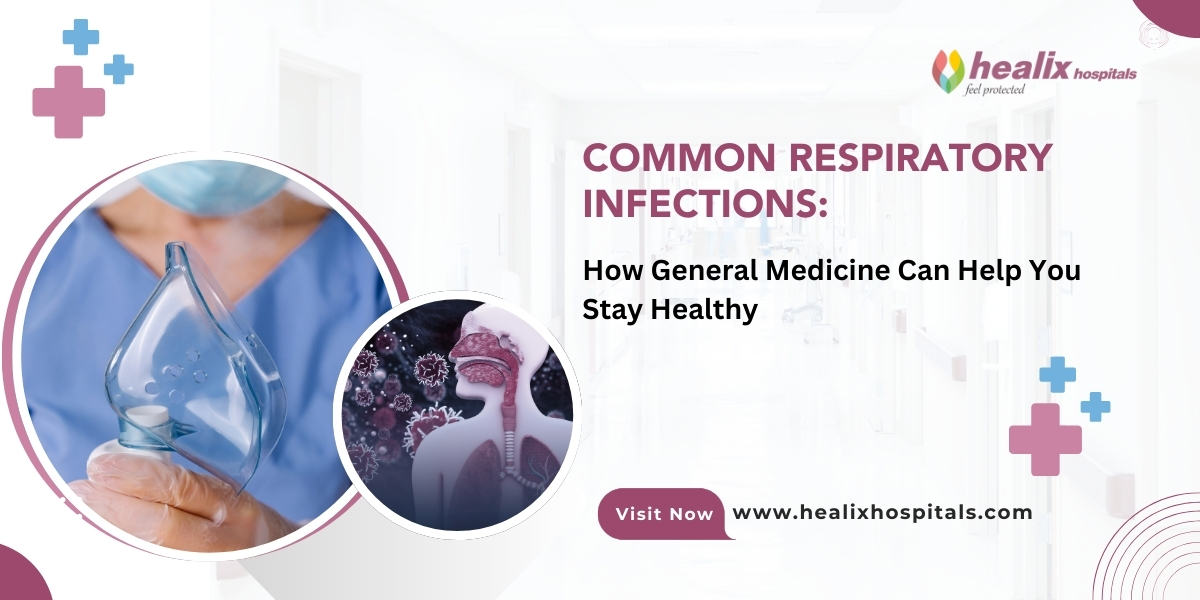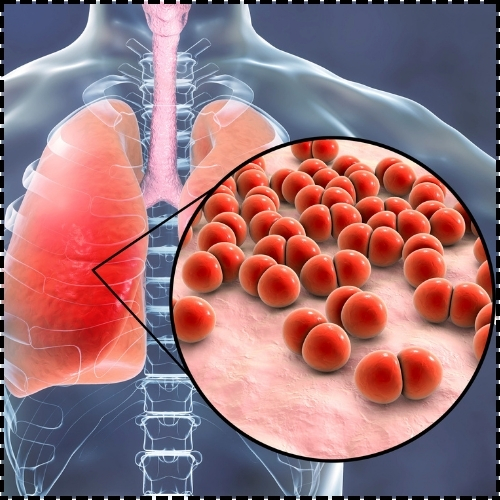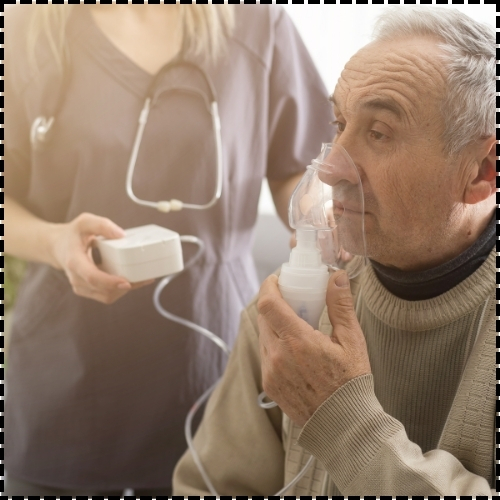Common Respiratory Infections: How General Medicine Can Help You Stay Healthy

Common respiratory infections affect millions of people every year, especially during colder seasons or when the immune system is compromised. From the common cold to more serious conditions like pneumonia, respiratory infections can range in severity and duration. Fortunately, general medicine offers effective treatments and prevention strategies to help keep these infections at bay and protect your overall health.
At Healix Hospitals, we focus on comprehensive care for a variety of common respiratory infections, including both upper and lower respiratory tract infections. Our general medicine team works closely with patients to provide the best treatments and preventive measures to maintain respiratory health.
Understanding Common Respiratory Infections
Common respiratory infections are illnesses caused by viruses, bacteria, or other pathogens that affect the respiratory system. They can be categorized into two main types:
- Upper respiratory infections (URIs) include conditions like the common cold, sinusitis, and laryngitis, which affect areas like the nose, throat, and sinuses.
- Lower respiratory infections (LRIs) are more severe and affect the lungs and airways. Examples include bronchitis, pneumonia, and chronic conditions like chronic obstructive pulmonary disease (COPD).
Recognizing respiratory infection symptoms early is key to getting the appropriate treatment and preventing complications.

Common Respiratory Infections and Their Symptoms
1. The Common Cold
One of the most common respiratory infections, the cold is typically caused by a virus, such as rhinoviruses. While it is usually mild, it can cause uncomfortable respiratory infection symptoms, such as:
- Runny or stuffy nose
- Sore throat
- Cough
- Sneezing
- Mild headache or body aches
2. Influenza (Flu)
The flu is another upper respiratory infection, but it tends to be more severe than the common cold. Flu symptoms often come on suddenly and can include:
- High fever
- Chills and sweats
- Muscle aches
- Fatigue and weakness
- Cough and sore throat
Both colds and flu can lead to lower respiratory infections like bronchitis or pneumonia if left untreated, especially in vulnerable populations.
3. Bronchitis
Bronchitis is an infection that causes inflammation of the bronchial tubes, leading to a persistent cough. It can be acute or chronic. Acute bronchitis typically follows a cold or flu, while chronic bronchitis is a long-term condition often caused by smoking or prolonged exposure to irritants.
4. Pneumonia
Pneumonia is a serious lower respiratory infection that affects the lungs and can be life-threatening if not treated. Respiratory infection symptoms of pneumonia include:
- High fever
- Chest pain
- Shortness of breath
- Cough with phlegm or pus
Pneumonia can be caused by bacteria, viruses, or fungi and requires prompt treatment for respiratory infections to avoid complications.

5. Sinusitis
Sinusitis, another upper respiratory infection, is caused by the inflammation of the sinuses, often following a cold or allergy flare-up. Symptoms include nasal congestion, facial pain, and headache.
Recognizing these respiratory infection symptoms and seeking timely medical advice can help prevent these infections from worsening.
Treatment for Common Respiratory Infections
At Healix Hospitals, our general medicine team provides personalized treatment for respiratory infections based on the severity of the illness and the patient’s overall health. General medicine and respiratory health go hand in hand, offering a range of treatment options that target both the infection and its symptoms.
1. Rest and Hydration
For mild infections such as the common cold, rest and adequate hydration are often the best remedies. Drinking plenty of fluids helps thin mucus, making it easier to expel from the body, while rest allows the immune system to fight off the infection.
2. Over-the-Counter Medications
For symptom relief, our general medicine team may recommend over-the-counter medications such as decongestants, antihistamines, and pain relievers. These can help alleviate respiratory infection symptoms like congestion, cough, and headaches. Common cold and flu treatments typically include these types of medications.
3. Prescription Medications
For bacterial infections like pneumonia or severe sinusitis, antibiotics may be prescribed to eliminate the infection. In cases of chronic respiratory infections such as COPD or asthma, long-term medications like inhalers or corticosteroids may be necessary to manage symptoms and prevent flare-ups.
4. Breathing Treatments
For more severe lower respiratory infections like bronchitis or pneumonia, breathing treatments such as nebulizers or oxygen therapy may be required to help improve lung function. Our specialists at Healix Hospitals are equipped to provide advanced respiratory care for such cases.
5. Preventive Vaccines
Vaccination plays a crucial role in preventing respiratory infections, especially the flu and pneumonia. Flu shots and pneumococcal vaccines can reduce your risk of contracting these infections or lessen their severity.

The Role of General Medicine in Respiratory Care
General medicine and respiratory health are closely linked, with primary care physicians playing a key role in diagnosing, treating, and preventing common respiratory infections. At Healix Hospitals, our general medicine team is trained to recognize early warning signs and recommend appropriate treatments to ensure faster recovery.
Importance of Early Diagnosis
Early detection through routine checkups can prevent common respiratory infections from becoming severe. By catching illnesses early, we can provide targeted treatment for respiratory infections and avoid complications such as pneumonia or chronic bronchitis.
Long-Term Management of Chronic Respiratory Infections
For patients suffering from chronic respiratory infections like asthma, bronchitis, or COPD, ongoing management is crucial. Regular visits to a general practitioner ensure that symptoms are controlled, medications are adjusted as necessary, and the risk of acute infections is minimized.
Patient Education and Prevention
In addition to providing treatment for respiratory infections, general medicine practitioners play a vital role in educating patients on respiratory infection prevention tips. This includes advising on proper hygiene practices, vaccination schedules, and lifestyle changes that can strengthen the immune system and reduce the risk of infection.
Preventing Respiratory Infections: Practical Tips
While common respiratory infections are prevalent, there are several strategies to reduce your risk of getting sick. At Healix Hospitals, we emphasize the following respiratory infection prevention tips to help patients stay healthy year-round:
1. Maintain Good Hygiene
One of the simplest and most effective ways to prevent common respiratory infections is to wash your hands regularly with soap and water. This is particularly important after coughing, sneezing, or touching surfaces in public spaces.
2. Get Vaccinated
Vaccines are a key part of preventing respiratory infections. Annual flu vaccines and pneumococcal vaccines can help protect against serious respiratory illnesses. Speak with your healthcare provider at Healix Hospitals to ensure your vaccinations are up to date.
3. Strengthen Your Immune System
Maintaining a healthy immune system is crucial in preventing infections. Eat a balanced diet rich in fruits and vegetables, exercise regularly, and get adequate sleep to keep your immune system strong.

4. Avoid Smoking and Pollutants
Smoking and exposure to air pollutants can weaken your lungs and increase your risk of chronic respiratory infections. Quitting smoking and minimizing exposure to harmful chemicals can significantly reduce the likelihood of developing severe respiratory illnesses.
5. Stay Hydrated and Rest
Hydration is essential for respiratory health. Drinking plenty of fluids helps keep the mucous membranes in your respiratory system moist and functioning properly. Additionally, getting enough rest boosts your body’s ability to fight infections.
Conclusion: How General Medicine Can Help You Stay Healthy
Common respiratory infections are a frequent part of life, especially during cold and flu season, but they don’t have to derail your health. With early detection, effective treatment for respiratory infections, and preventive care, you can avoid serious complications and maintain good respiratory health.
At Healix Hospitals, our general medicine team is dedicated to providing expert care for respiratory conditions, from mild colds to chronic infections. We work closely with our patients to provide personalized treatment plans and respiratory infection prevention tips that keep you healthy year-round.
Whether you need routine checkups, vaccinations, or treatment for an ongoing respiratory condition, our skilled healthcare professionals are here to help. Contact Healix Hospitals today to schedule your consultation and stay one step ahead of respiratory infections.
FAQs
Q: What are common respiratory infections?
A: Common respiratory infections include the common cold, flu, bronchitis, pneumonia, and sinusitis. These infections can range from mild to severe, affecting both the upper and lower respiratory tracts.
Q: How can general medicine help with respiratory infections?
A: General medicine and respiratory health are closely related, with general practitioners diagnosing, treating, and preventing common respiratory infections through medications, vaccinations, and lifestyle advice.
Q: What are the symptoms of respiratory infections?
A: Respiratory infection symptoms include coughing, sore throat, runny nose, congestion, fever, and shortness of breath. More severe symptoms, such as chest pain or difficulty breathing, may indicate a lower respiratory infection like pneumonia.
Q: How can I prevent respiratory infections?
A: Preventing respiratory infections involves good hygiene practices, staying up to date on vaccines, maintaining a healthy immune system, and avoiding smoking or exposure to pollutants.
Q: When should I see a doctor for a respiratory infection?
A: You should see a doctor if your respiratory infection symptoms worsen or last more than a week, if you experience high fever, shortness of breath, or chest pain, or if you have a chronic condition that makes you more susceptible to severe infections.
Comments